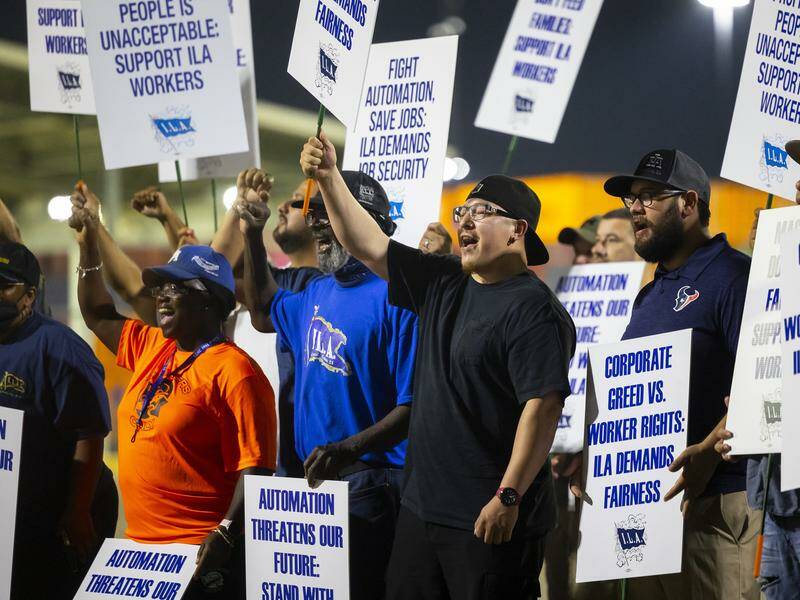Dockworkers Union Reaches Temporary Deal to Suspend Strike, Extending Labor Talks to January
The International Longshoremen’s Association (ILA), which represents dockworkers along the East and Gulf coasts of the United States, has reached a deal with the U.S. Maritime Alliance to suspend their strike until at least January 15, 2024. This suspension provides a critical window for both parties to negotiate a new six-year contract, as reported by a source close to the matter.

According to reports from the Associated Press, both sides have reached an agreement on wage increases, signaling progress in what has been a tense period of labor disputes. The dockworkers will return to their duties immediately, ensuring that ports vital to the nation’s supply chain remain operational for the holiday season—a crucial time for U.S. commerce. With the strike temporarily halted, negotiations will continue between the ILA and the U.S. Maritime Alliance, which represents shippers and ports.
Strategic Timing
The suspension of the strike comes at a pivotal moment. With economic uncertainty looming and inflation still a pressing issue for many Americans, any disruption to the nation’s ports would exacerbate existing supply chain problems, driving up costs for consumers and businesses alike. This temporary agreement helps to avert a potential crisis as the country approaches the peak holiday shipping season, safeguarding the flow of goods crucial to both the economy and daily life.
Some may argue that this suspension is simply delaying the inevitable, as both parties still need to hammer out the specifics of a new contract. However, by pushing negotiations into 2024, the agreement gives both the union and the U.S. Maritime Alliance the breathing room necessary to negotiate a more comprehensive and balanced resolution. A long-term disruption would have been disastrous, especially given the ongoing political debates over labor rights, minimum wage, and inflation control.
Conservative Economic Perspective
From a conservative perspective, the temporary suspension of the strike can be seen as a pragmatic and necessary step to protect the U.S. economy. Disruptions to major ports would have led to increased costs for businesses, particularly small businesses already struggling under rising inflation and regulatory burdens. This type of disruption can only fuel liberal rhetoric advocating for more government intervention, which would likely exacerbate economic challenges rather than resolve them.
Moreover, this agreement demonstrates that free-market negotiations can succeed without needing overreach from the federal government. The decision to pause the strike and return to the negotiating table serves as a reminder that labor disputes can be handled through dialogue between private-sector parties, avoiding the potential pitfalls of bureaucratic interference. Conservatives have long argued for minimizing the role of government in private labor disputes, and this development underscores that such disputes can be resolved without excessive regulation.
A Complex Labor Landscape
The dockworkers’ demand for wage increases reflects the broader economic context of post-pandemic recovery. While inflation has been a key concern, the demand for increased compensation is understandable given the rising costs of living. However, it is essential to strike a balance between ensuring fair wages for workers and maintaining the economic stability of businesses, particularly within industries that play a critical role in the national infrastructure.
There is an increasing risk that unions will use their leverage during critical times to extract concessions, a tactic that could become more prevalent if the Biden administration continues to encourage pro-labor policies. From a conservative viewpoint, giving in to excessive union demands can create unsustainable wage structures, leading to higher consumer prices and further aggravating inflationary pressures. The fact that both sides appear to be moving toward a wage agreement without triggering a larger economic disruption suggests that careful negotiations—free from government interference—can yield a more stable outcome.
Broader Implications
This suspension of the strike until January 2024 sets a precedent for other labor negotiations in sectors across the country. With an increasing number of industries facing labor shortages and inflationary pressures, the outcome of these negotiations will likely influence how other unions and management teams approach their own contracts.
Ultimately, this pause in labor action presents an opportunity to seek long-term solutions rather than short-term fixes. For conservatives, it is critical that any final agreement respects both the need for fair wages and the larger objective of maintaining a robust and competitive U.S. economy. Over-regulation and government intervention, as seen in the current administration, often lead to unintended consequences, and this labor dispute exemplifies the need for market-based resolutions that preserve economic growth and freedom.
Sponsors:
Huge Spring Sale Underway On MyPillow Products
Use Promo Code FLS At Checkout
Inflation Buster: Freedom From High-Cost Cell Plans (50% off first month with promo code: FLS)

